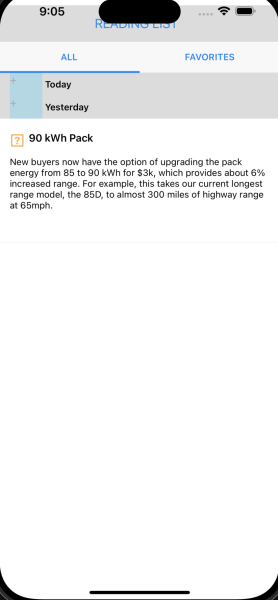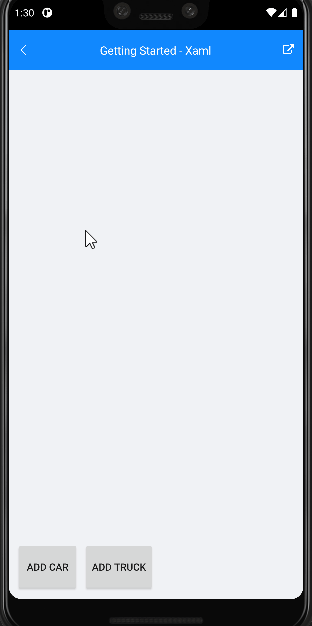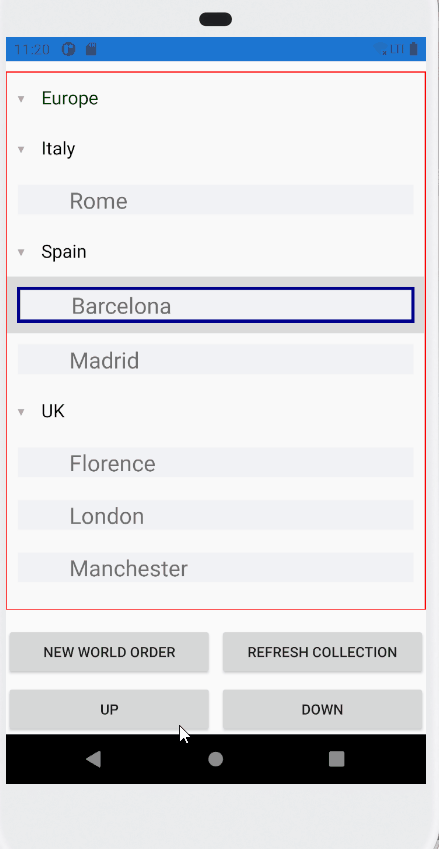App hangs when ListView uses dynamic size for the cells:
iOS 16.7.5: Does not hangiOS 17.3.1: Does not hang
iPadOS 16.3: Does not hang
iPadOS 17.1: Does not hang
iPadOS 17.2: Hangs/eventual app crash
iPadOS 17.3.1: Hangs/eventual app crash
If the ListView ItemTemplate contains more elements and you try to load more items (>15 items), there is a crash on iOS related to layout arrangements.
To workaround the issue, set explicitly ItemLength:
<telerikDataControls:RadListView.LayoutDefinition>
<telerikListView:ListViewLinearLayout ItemLength="400" />
</telerikDataControls:RadListView.LayoutDefinition>
When using load on demand mode manual, and collapsing groups, one item left not collapsed.
Go to QSF ListView->selection example
1. Select the 2nd row and swiped it to the left
2. While the row above is still in the left-swiped mode with its red delete button still visible, click on a DIFFERENT row (say the 3rd row) AND scroll the ListView.
Video attached.
When Group Header template is used and the visibility of an element in the template is changed, the template does not recreate as expected.
For example add entry /editor in the template and change its visibility
On iOS the editor/entry overlaps the group header and cannot type in it.
On UWP : The editor is visualized as expected but then we change its visibility to false, the space for the editor is still visible. The group header does not layout as expected.
Solution:
You have to collapse/expand the group header so the template in the group header to layout as expected
Workaround:
1. Set IsGroupHeaderStickty to false.
or
2. Use the default group header template
when we try to add a dynamic AutomationId in each item of the list (something like AutomationId="{Binding Id}"), the AutomationId is not provided to the elements we see in the appium inspector.
Works with fixed values
When adding swipe content, it block the button to be clicked when the items in the cell matches the swipe offset value,
a. reduce the swipe offset.
b. place the minus button further to the left, so the button width to match the ListView swipe offset
Sample setup:
<telerikDataControls:RadListView x:Name="listView"
IsItemSwipeEnabled="True"
SwipeOffset="90, 0, 0, 0"
SwipeThreshold="20"
ItemsSource="{Binding Source}"
SelectionMode="None">
<telerikDataControls:RadListView.ItemTemplate>
<DataTemplate>
<listView:ListViewTemplateCell>
<listView:ListViewTemplateCell.View>
<Grid ColumnDefinitions="*,90">
<!-- >> changed second row to 90 pixels, which is swipe offset -->
<Label
FontAttributes="Bold"
FontSize="16"
Text="{Binding Sender}"
TextColor="Black" />
<StackLayout Grid.Column="1"
Orientation="Horizontal">
<Button
Clicked="Button_Clicked_1"
Text="+++"
TextColor="Gray" />
<Button
Clicked="Button_Clicked"
Text="---" />
</StackLayout>
</Grid>
</listView:ListViewTemplateCell.View>
</listView:ListViewTemplateCell>
</DataTemplate>
</telerikDataControls:RadListView.ItemTemplate>
<telerikDataControls:RadListView.ItemSwipeContentTemplate>
<DataTemplate>
<Grid
Margin="0"
Padding="0"
ColumnSpacing="0"
RowSpacing="0">
<Grid.ColumnDefinitions>
<ColumnDefinition Width="90" />
<ColumnDefinition Width="*" />
</Grid.ColumnDefinitions>
<telerikInput:RadButton
Grid.Column="0"
Margin="0"
BackgroundColor="Red"
Clicked="RadButton_Clicked"
FontFamily="FontAwesomeSolid"
FontSize="Medium"
Text=""
WidthRequest="90" />
</Grid>
</DataTemplate>
</telerikDataControls:RadListView.ItemSwipeContentTemplate>
</telerikDataControls:RadListView>
Object name: 'Telerik.XamarinForms.DataControlsRenderer.Android.RadListViewDataSourceAdapter'.'
is thrown when navigating to another view using ListView SelectedItem and removing the view where the ListView is placed.
Workaround:
Instead of removing the view, change the view visibility.
On Android when adding new item to the ListView which is RadExpander with RadListView inside it, and when removing and adding item with different length the cell is not measured correctly.
On iOS the ListView cell are not automatically sized. one height for cell is used
On UWP when adding the second item the app crashes with "System.ArgumentException: An item with the same key has already been added. Key: SDKBrowser.Examples.ListViewControl.GettingStartedCategory.GettingStartedExample.Product\r\n at System.ThrowHelper.ThrowAddingDuplicateWithKeyArgumentException(Object key)\r\n at System.Collections.Generic.Dictionary`2.TryInsert(TKey key, TValue value, InsertionBehavior behavior)\r\n at Telerik.UI.Xaml.Controls.Data.ListView.Model.BaseLayoutStrategy.RecycleLocally()\r\n at Telerik.UI.Xaml.Controls.Data.ListView.Model.BaseLayout"
If changing the value of the property in which listview is sorted, sorting is not applied.
Workaround:
Clear the sort descriptors then reapply them.
When applying multi-level grouping, then change the items group keys, the new groups are added but the old ones are still visible in the list view, and from child group they become parent group.
Workaround:
clear the group descriptors before changing the items and then re-add the group descriptors again
Workaround:
Set IsContentPreserved property to the TabView control



